Event Highlights: KIX EMAP Webinar 24: Inclusive Education in Europe and Central Asia: Inclusive Education in Practice
KIX EMAP Webinar 24, “Inclusive Education in Europe and Central Asia: Inclusive Education in Practice,” took place on 27 February 2025. This was the second webinar in a two-part series, delving into the practical application of inclusive education principles across Europe and Central Asia. The event was organised with simultaneous interpretation in English, Mongolian, Romanian, Russian, Ukrainian, and Uzbek, and attracted over 220 participants from 39 countries.
Watch the recording in other languages: Mongolian, Russian, Ukrainian, and Uzbek.
The webinar was held around two roundtable discussions, featuring eleven speakers from seven countries, representing diverse sectors, including government, academia, civil society organisations, and educational institutions.
The first roundtable began with a discussion on stakeholder collaboration for inclusive education. In this session, Anara Nadirbekova (Kyrgyzstan) and Ekaterine Dgebuadze (Georgia) explored key factors that contribute to successful collaboration among stakeholders, sharing effective strategies and practices. The discussion continued with Antonina Li (Kyrgyzstan), Asadullo Zikrikhudoev (Tajikistan), and Ludmila Malcoci (Moldova), who shared their experiences of community and family engagement in supporting inclusive education, emphasising their key role in achieving impactful results.
The second roundtable focused on inclusive education classroom experiences. It started with a discussion on successful policies and practices targeting the implementation of inclusive education principles in education setting, featuring Chuluunkhishigt Enebish (Mongolia), Nelya Koretska (Ukraine), and Abdurauf Abduganiev (Uzbekistan). Following this, Pagma Tserendorj (Mongolia), Halyna Musienko (Ukraine), and Elena Volkova (Uzbekistan) discussed inclusive teaching approaches and practices in the classroom, sharing challenges and inspiring success stories.
This insightful webinar also offered an opportunity for questions and comments from the audience, covering topics such as digital technology and educational data, inclusive education conditions in the classroom, social entrepreneurship and inclusive job creation models, law-making process, the quality of inclusive education and more.
This webinar was the second event in a two-part series. Read the event highlights of KIX EMAP Webinar 23 here.
See useful resources shared by the speakers:
Kyrgyzstan:
The Shoola-Kol Association supports children aged 0 to 3 years who have developmental delays or are at risk in Kyrgyzstan.
Moldova:
Keystone Moldova promotes inclusion, builds sustainable community-based support systems, and advocates alongside people with disability.
- Watch a video
- Read a study: Inclusion of Children with Special Educational Needs in the Education System (English)
- Read a study: Implementing Inclusive Education in the Republic of Moldova (Romanian)
Tajikistan:
- Learn more about the National Association of People with Disabilities of Tajikistan
Speakers
Georgia
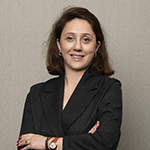
Ekaterine Dgebuadze holds a degree in Educational Philosophy with a specialisation in special education from Oslo University, and has extensive experience with the Ministry of Education, Science, and Youth in Georgia, leading initiatives in inclusive education, even in the position of Deputy Minister of the Ministry of Education and Science of Georgia. Her experience aligns with the USAID program in my capacity as an Inclusive Education Director. Currently, she holds the position of Principal at the Eastern Partnership European School.
Kyrgyzstan
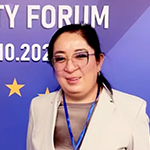
Anara Nadirbekova holds a master’s degree in Pedagogy, specialising in Special Pedagogy. Since 2018, she has been the Director of the Eurasia Foundation of Central Asia of the Kyrgyz Republic. At the foundation, she has worked as a consultant on the rights of refugees, ethnic minorities and migrants. She was also actively involved in promoting the rights of people with disabilities and children in difficult situations. She has been recognized with numerous honours, including the 2018 Honorary Diploma from the Ministry of Labor and Social Development of the Kyrgyz Republic for her contribution to the protection of the rights of people with disabilities, the 2019 Excellence in Social Work award.
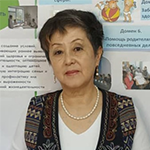
Antonina Li holds a law degree with honours in Jurisprudence and has been the chairman of the Public Association «Shoola-Kol» since 2001. Her experience includes collaboration with the National Center for Maternal and Child Health to conduct four surveys on developmental abnormalities in children aged 0 to 3. Additionally, she led human rights monitoring on key topics, with her findings reported and published in several books including ‘Access to Education for Disabled Children’. In 2005, she was awarded a Certificate of Honor from the President of the Kyrgyz Republic, Askar Akayev, for her services in the social sphere.
Moldova
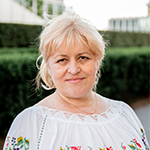
Ludmila Malcoci is the Executive Director of Keystone Moldova and Regional Director (Central and Eastern Europe) of Keystone Human Services International. She has decades of experience in management, research, and development in the Republic of Moldova and the wider region. Her work and organization have advocated for people with disabilities, inclusive education, gender equality, and more. She has worked with international organizations such as UNICEF, World Bank, and the Soros Foundation, along with various levels of government in Moldova, Kazakhstan, Russia, Romania, Belarus, Turkey, and Ukraine. Most recently, Keystone Moldova has been working with Ukrainian refugees with disabilities and students who have fled the war with Russia. Dr. Malcoci holds a Ph.D. Habilitate in Sociology from the Institute of Philosophy, Sociology and Law of the Academy of Sciences (Republic of Moldova) and an undergraduate university degree in Journalism from Chisinau State University.
Mongolia
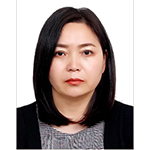
Chuluunkhishigt Enebish is a mathematics teacher and lawyer with a master’s degree in Educational Administration, currently pursuing a doctoral degree in Educational Studies. Additionally, she is a trainer in the theory and methodology of inclusive education and human rights. She began her career as a mathematics teacher and training manager before transitioning to the role of inspector at the Metropolitan Inspection Agency and later Senior Inspector of Educational Supervision at the Metropolitan Education Department. Since 2023, she has served as the Head of the Inclusive Education Department at the General Authority for Education.
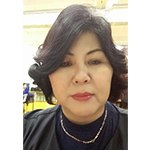 Pagmaa Tserendorj is a lead teacher with 35 years of experience in the field of education and holds a master’s degree in educational studies. Over the course of her career, she has delivered presentations at both national and international conferences, earning multiple awards, including the national award for her presentation “Inclusive Education – The Right Approach”. She has published more than ten recommendations and books in the field, two of which have been published and disseminated nationally. Her work was published in the book “Disabilities and Equal Access-2022” published by the Ministry of Labor and Social Protection. She has implemented various educational programs, such as the STEM+Kinder program. For the past 3 years, she has been sharing good practices of inclusive education by including children with disabilities in her kindergarten and providing 6 types of additional services to these children.
Pagmaa Tserendorj is a lead teacher with 35 years of experience in the field of education and holds a master’s degree in educational studies. Over the course of her career, she has delivered presentations at both national and international conferences, earning multiple awards, including the national award for her presentation “Inclusive Education – The Right Approach”. She has published more than ten recommendations and books in the field, two of which have been published and disseminated nationally. Her work was published in the book “Disabilities and Equal Access-2022” published by the Ministry of Labor and Social Protection. She has implemented various educational programs, such as the STEM+Kinder program. For the past 3 years, she has been sharing good practices of inclusive education by including children with disabilities in her kindergarten and providing 6 types of additional services to these children.
Tajikistan
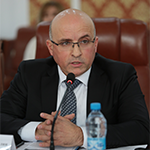
Asadullo Zikrikhudoev has been the chairman of the National Union Of People With Disabilities Of Tajikistan since 2016. Previously he served as the chairman of the Association of People With Disabilities of Dushanbe “IMKONIYAT”. He is a member of the Public Council under the President of the Republic of Tajikistan and the permanent working group under the Majlisi Namoyandagon of the Majlisi Oli of the Republic of Tajikistan. From 2016 to 2023, he was a member of the ODIHR International Expert Group on the Participation of Persons with Disabilities in Political and Public Life. Since 2022, he has been Vice-President of the International Union of Organizations of People with Disabilities of the Former USSR Countries for work with UN structures and a Board member of the World Disability Union since 2019. In 2015, he was awarded the title of “Best Human Rights Defender of the Year” in Tajikistan. His areas of expertise include: the ratification process of the Convention on the Rights of Persons with Disabilities, lobbying for the creation of an accessible environment, lobbying for inclusive education. Currently, Asadullo is actively working on a new law on the “Rights of People with Disabilities in the Republic of Tajikistan”.
Ukraine
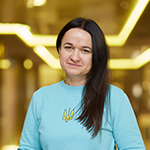
Halyna Musienko graduated from Rivne State University of Humanities with a specialisation in primary education. She worked as a primary school teacher for several years, then as a teacher-organiser, a group leader in a vocational school, and as a deputy director of educational work in a lyceum and a secondary school. Since March 2023 Halyna has been working as the head of the educational centre of the state institution ” Superheroes’ School”, which is situated in the National Children’s Specialized Hospital Okhmatdyt of the Ministry of Health of Ukraine. Halyna organises the provision of educational services for children receiving pre-school or full general secondary education and undergoing in-patient treatment or rehabilitation in a healthcare facility, plans, organises and ensures the activities of the educational centre, selects staff and coordinates the work of its employees.
Nelya Koretska is the Head of the Expert Group on Inclusive Education, Special Education and Barrier-Free Education at the Directorate of Preschool and Inclusive Education of the Ministry of Education and Science of Ukraine. She joined the Ministry of Education and Science of Ukraine in 2012. As the Нead of the mentioned expert group, she is responsible for the development of state policy documents and regulations in the field of education of children with special educational needs. She coordinates local authorities and self-government bodies in implementing state policy on inclusive education. She analyses the state of general secondary education institutions, special schools, and support centres for inclusive education. Additionally, she advises the expert commission on special pedagogy and psychology regarding state standards, textbooks, and manuals for children with special needs and their teachers. She also participates in events focused on the education and rehabilitation of children with special needs.
Uzbekistan
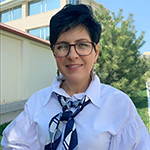
Elena Volkova, holds a Master of Education from the University of Exeter, College of St Mark and St John. She currently serves as a Course Leader for the MA in Learning and Teaching at Westminster International University in Tashkent, where she is also the module leader for “Introduction to Inclusive Education.” Additionally, Elena is the Editor-in-Chief of ALT FL in Uzbekistan and a peer editor for SAP and SAGE.
Abdurauf Abduganiev, Lead specialist at the Department for Coordinating Inclusive Education and Caring School Activities of the Ministry of Preschool and School Education.
Our partners
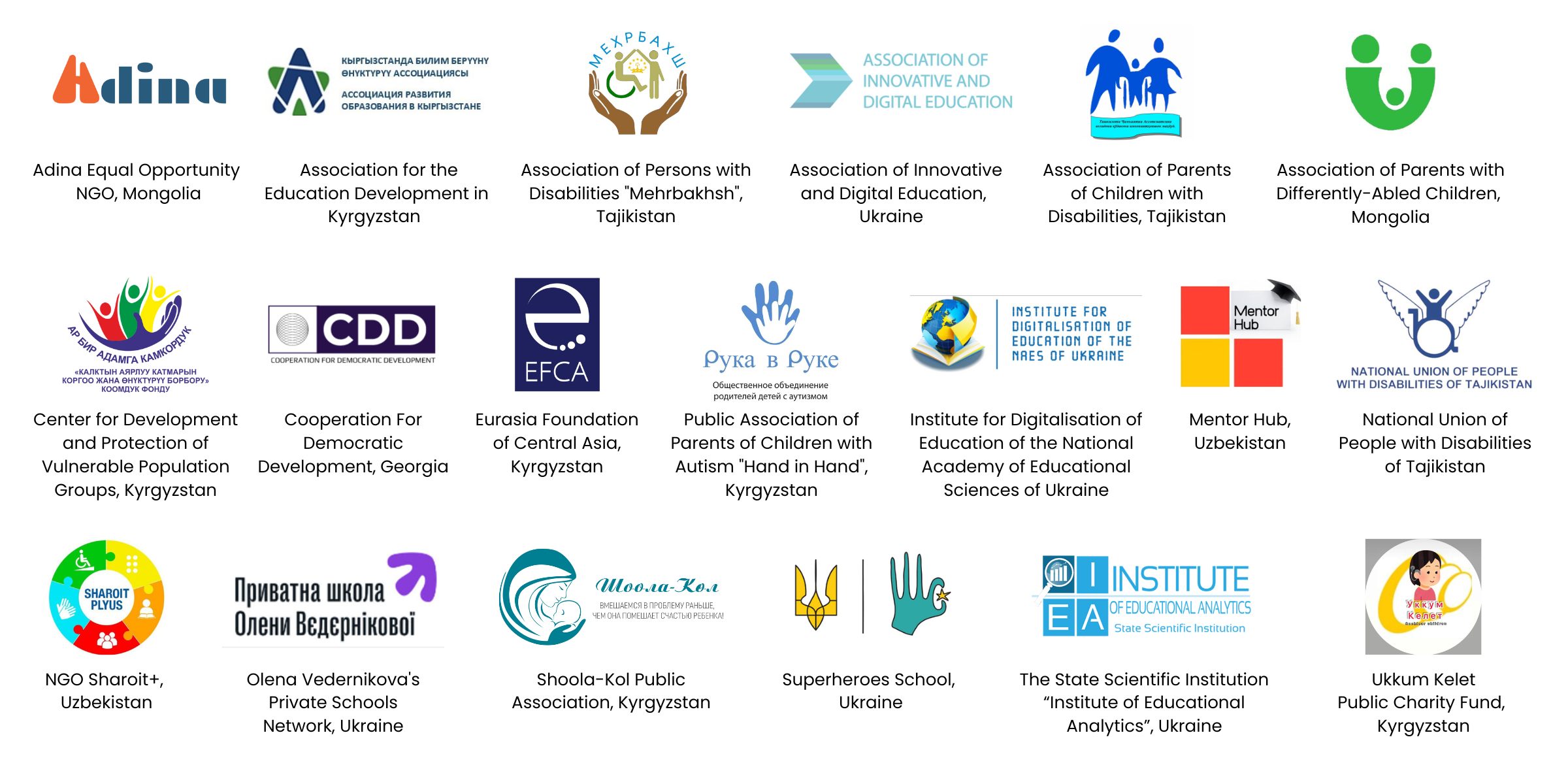
Основные моменты события: 24-й Вебинар KIX EMAP: Инклюзивное образование в Европе и Центральной Азии: инклюзивное образование на практике
24-й вебинар KIX EMAP «Инклюзивное образование в Европе и Центральной Азии: инклюзивное образование на практике» состоялся 27 февраля 2025 года. Это был второй вебинар в серии из двух частей, сфокусированный на практическом применении принципов инклюзивного образования в Европе и Центральной Азии. Мероприятие было организовано с синхронным переводом на английский, монгольский, румынский, русский, украинский и узбекский языки и собрало более 220 участников из 39 стран.
Смотреть запись мероприятия на английском, монгольском, украинском и узбекском языках.
Вебинар проходил в форме двух круглых столов, в которых приняли участие одиннадцать спикеров из семи стран, представляющих различные сектора, включая правительство, научные круги, организации гражданского общества и образовательные учреждения.
Первый круглый стол начался с обсуждения вопросов сотрудничества заинтересованных сторон в области инклюзивного образования. На этой сессии Анара Надирбекова (Кыргызстан) и Екатерина Дгебуадзе (Грузия) рассмотрели ключевые факторы, которые способствуют успешному сотрудничеству между заинтересованными сторонами, обмену эффективными стратегиями и практиками. Дискуссию продолжили Антонина Ли (Кыргызстан), Асадулло Зикрихудоев (Таджикистан) и Людмила Малкочи (Молдова), которые поделились своим опытом участия сообщества и семьи в поддержке инклюзивного образования, подчеркнув их ключевую роль в достижении значимых результатов.
Второй круглый стол был посвящен инклюзивным практикам в классе. Он начался с обсуждения успешных стратегий и практик, направленных на реализацию принципов инклюзивного образования, в котором приняли участие Чулуунхисигт Энебиш (Монголия), Неля Корецкая (Украина) и Абдурауфа Абдуганиев (Узбекистан). Вслед за этим Пагма Церендорж (Монголия), Галина Мусиенко (Украина) и Елена Волкова (Узбекистан) обсудили подходы и практику преподавания в классе, поделились проблемами и вдохновляющими историями успеха.
Этот содержательный вебинар также предоставил возможность аудитории задать вопросы и предложить комментарии, охватывая такие темы, как цифровые технологии и образовательные данные, условия инклюзивного образования в классе, социальное предпринимательство и модели создания инклюзивных рабочих мест, законотворческий процесс, качество инклюзивного образования и многое другое.
Этот вебинар стал вторым мероприятием в серии из двух частей. Ознакомиться с основными моментами 23-го вебинара KIX EMAP можно здесь.
Смотрите полезные ресурсы, которыми поделились спикеры:
Кыргызстан:
Ассоциация «Шоола-Кол» поддерживает детей в возрасте от 0 до 3 лет с задержками развития или находящихся в группе риска в Кыргызстане.
Молдова:
Keystone Moldova продвигает инклюзивность, создает устойчивые системы поддержки на уровне сообщества и выступает вместе с людьми с ограниченными возможностями.
- Посмотрите видео
- Прочитайте исследование «Включение детей с особыми образовательными потребностями в систему образования» (на английском языке)
- Прочитайте исследование «Внедрение инклюзивного образования в Республике Молдова» (на румынском языке)
Таджикистан:
- Узнайте больше о Национальном объединении инвалидов Таджикистана
Наши партнеры


